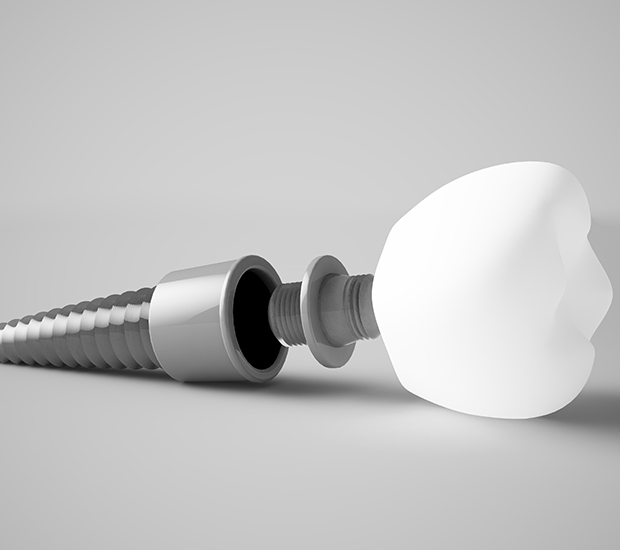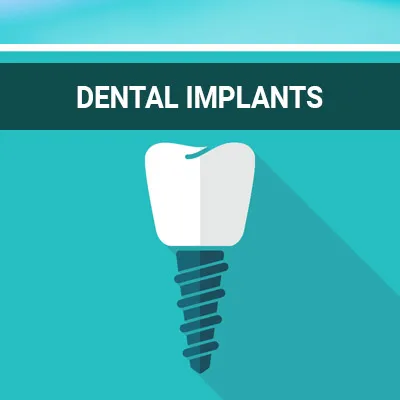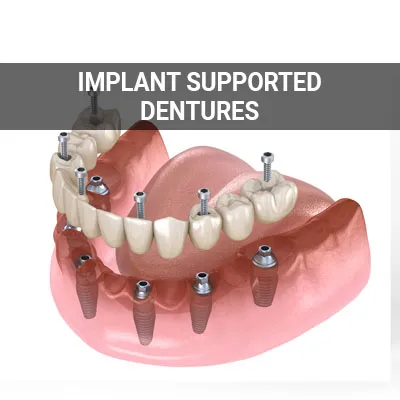Prosthodontist Miami, FL
Prosthodontics is a field within dentistry that focuses on restoring missing or deficient teeth. The term comes from the words "prostho," meaning replacement, and "dontics" referring to the teeth. Prosthodontists are dental specialists who treat patients using prosthetics such as crowns, implants, bridges, dentures, and bonding.
Prosthodontics is available at South Florida Dentistry in Miami and the surrounding area. We can help you better understand your condition and discuss treatment options that best suit your lifestyle. Call us today at (305) 203-4097 to schedule an appointment or learn more about our services.
Prosthodontics Explained
The American College of Prosthodontics defines the term as a dental specialty responsible for the diagnosis, treatment planning, rehabilitation, and maintenance of the oral function, comfort, appearance, and health of patients with clinical conditions. These conditions are associated with missing or deficient teeth or oral and maxillofacial tissues. Prosthodontists have the specialized training and experience in providing treatments that restore both aesthetic and oral function.
Possible treatments for restoring missing or deficient teeth include bone grafts, dental bonding, prosthetics, and cosmetics. Each treatment comes with its own set of advantages and disadvantages, which are explained after the initial consultation appointment. Thoroughly examining the patient allows our team to give a proper diagnosis and recommend treatments that work for their condition.
“They are specially trained and experienced in providing treatments that restore both aesthetic and oral function.”
Board-Certified Prosthodontists
Many prosthodontists choose to seek board certification to set them even further apart from other dental professionals. This designation demonstrates a commitment to lifelong learning and ethical practices. Board certification also shows that the professional values the patient-doctor relationship and is devoted to advancing restorative dentistry.
To obtain board certification, a prosthodontist must successfully pass the American Board of Prosthodontics' four-part examination. The ABP requires certified professionals to undergo the recertification process every eight years to ensure they are current on best restorative practices.
“Many prosthodontists choose to seek board certification to set them even further apart from other dental professionals.”
Why Prosthodontics
Patients who can benefit from a prosthodontist's care and knowledge often have complex or atypical dental restoration needs. A prosthodontist can help with the following issues:
- Cleft palates or missing teeth
- Complete and removable partial dentures
- Complex care management
- Cosmetic dentistry
- Dental implants
- Oral cancer reconstruction
- Snoring and sleep disorders
- Temporomandibular joint syndrome/disorder
- Tooth replacement
- Traumatic facial injuries
While cosmetic dentists and general dentists can provide care for some of the above issues, consultation with a prosthodontist before undergoing dental restoration helps explore various treatment options. Prosthodontists have advanced training and utilize the most current restoration technology and techniques. Moreover, these professionals work with an understanding of the mouth's intricate dynamics, which helps achieve optimal smile makeover results.
“Prosthodontists have advanced training and utilize the most current restoration technology and techniques.”
Check out what others are saying about our dental services on Yelp: Prosthodontist in Miami, FL
Areas of Prosthodontic Treatment
All prosthodontic patients undergo an extensive examination and consultation before receiving treatment. Once the doctor has a deep understanding of a patient's needs, an in-depth treatment plan is devised that may or may not necessitate several other dental professionals. Though the list of treatments is extensive, prosthodontists generally offer the following services:
- Crowns: Patients may need crowns if they recently underwent a root canal or have fractured, misshapen or broken teeth. Crowns cover the entire visible surface of a tooth above the gum line. They are sometimes also known as caps.
- Porcelain Veneers: Veneers are ultra-thin casings of ceramic that cover the front of the tooth. Veneers reshape, elongate, or change the color of teeth. Occasionally they are implemented to close small gaps.
- Dental Implants: Implants are necessary to replace missing or severely damaged teeth. Implants consist of titanium steel posts that the dentist embeds into the gum line via a surgical procedure. These posts fuse to the jawbone and provide unwavering support for the cap, designed to look and feel like a natural tooth.
- Dentures: Full and partial dentures help improve the aesthetics and functionality of a person who is missing several teeth. Implant-supported dentures provide additional stability. They are attached to the implants rather than resting on the gums.
- Fixed Bridges: This method involves using a natural tooth on either side of a gap to support a bridge of one or more artificial teeth. The placement of a bridge usually takes several dental visits. Bridges may last for 10 to 15 years.
“All prosthodontic patients undergo an extensive examination and consultation before receiving treatment.”
Questions Answered on This Page
Q. How can a prosthodontist become board-certified?
Q. Why should I see a prosthodontist over a cosmetic or general dentist?
Q. What are the various areas of prosthodontic treatment?
Q. How fixed prosthodontics vs. removable prosthodontics are different?
Q. What reconstructive dentistry options exist?
People Also Ask
Q. What should I do if I lose teeth?
Q. What are the benefits of dental implants?
Q. Why are dentures a preferred treatment?
Q. How can I prepare for my first implant procedure?
Q. Are there temporary replacements for teeth?
Q. What should I know about post-procedure care and adjusting to a healthy life?
Reconstructive Dentistry
Reconstructive, or restorative, dentistry refers to the practice of replacing missing or damaged teeth and falls under prosthodontics. Reconstructive dentistry includes full mouth reconstruction and other aesthetic and functional treatments for one or more missing teeth. Reconstruction is often necessary as it can help:
- Fill empty spaces in the mouth, keeping the teeth in proper alignment
- Replace teeth, making it easier to maintain good oral care habits and help prevent plaque build-up
- Improve patient health, appearance, and self-esteem
Reconstructive treatments can be done by a prosthodontist, dentist, or reconstructive dental professional. Treatment options include fillings, crowns, bridges, and implants. Reconstructive dentistry focuses primarily on both restoring aesthetic and oral function as well as reconstructing the mouth to prevent further dental complications from arising.
“Reconstructive, or restorative, dentistry refers to the practice of replacing missing or damaged teeth and falls under prosthodontics.”
Frequently Asked Questions
Q. Why should I seek a prosthodontist instead of a general dentist?
A. It is wise to choose a prosthodontist for reconstructive or restorative dental concerns as they are specially trained to provide treatment for missing and damaged teeth. They will also likely have special tools and equipment designed for prostheses and can better treat more complex cases. A general dentist may refer their patient to a prosthodontist when the need arises.
Q. How can I properly care for my restored teeth?
A. Patients with dental restorations can keep their teeth healthy using a lifelong recall and maintenance approach, reducing the risk for failure of tooth and implant-borne restorations.This approach poses that patients who schedule and meet their routine checkups and follow-up appointments, especially when feeling symptoms, and regularly maintain their oral hygiene as well as take care of all treatments immediately are more likely to keep their prosthesis and teeth healthy.
Q. How often are follow-up appointments for prosthodontic treatments?
A. We recommend patients schedule follow-ups every six months to clean, adjust, repair, or replace their restorations. We ensure the prosthesis is working properly during these routine examinations and is not affecting any surrounding teeth, bone, or gums. Routine follow-ups are the best way to maintain your prosthesis and keep your oral cavity healthy post-treatment.
Q. Are there any special home-care tips for restored teeth?
A. Patients with restored teeth should take extra precautions and practice thorough oral hygiene habits to keep their mouth well-maintained. Brush teeth with a fluoride toothpaste at least twice a day, floss at least once a day, use a mouthwash recommended by your prosthodontist, wear a night guard (if recommended by your prosthodontist) to protect your restorations, and avoid smoking or chewing tobacco and high-sugar or high-acid foods and beverages.
Q. How can I prepare for prosthodontic treatment?
A. During the initial consultation appointment, South Florida Dentistry will explain the chosen treatment in detail, ensuring the patient knows what to expect on the day of their procedure. We recommend patients sleep well the night before, brush and floss, and come in early to the appointment, which can help greatly reduce anxiety or fear.
Prosthodontist Terminology
Call Us Today
Prosthodontics can bring your smile back. We at South Florida Dentistry can help. Call us today at 305-203-4097 to schedule an appointment or learn more about our services.
Helpful Related Links
- American Dental Association (ADA). Glossary of Dental Clinical Terms. 2025
- American Academy of Cosmetic Dentistry® (AACD). Home Page. 2025
- WebMD. WebMD’s Oral Care Guide. 2025
About our business, and website security
- South Florida Dentistry was established in 1997.
- We accept the following payment methods: American Express, Cash, Check, Discover, MasterCard, and Visa
- We serve patients from the following counties: Miami-Dade County
- We serve patients from the following cities: Miami, Doral, Hialeah, Fontainebleau, Hialeah Gardens, Sweetwater, Coral Gables, Kendall, South Miami, Miami Lakes, Miami Gardens, Medley, Westchester and Brickell
- Healthgrades. View Background Information and Reviews
- Norton Safe Web. View Details
- Trend Micro Site Safety Center. View Details
Back to top of Prosthodontist











